July 31, 2023 •
Close the Revolving Door Act Introduced in U.S. Senate
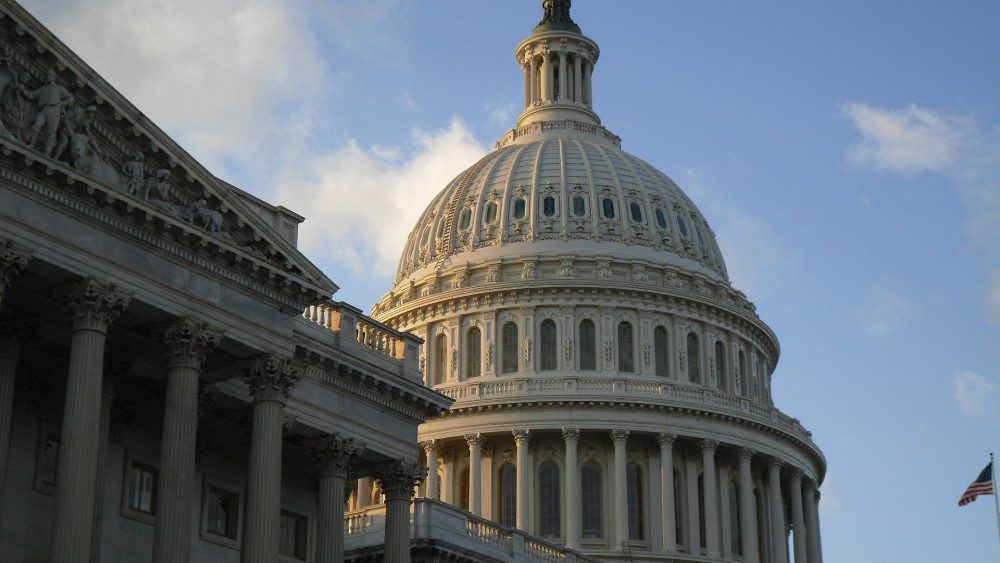
On July 27, legislation was introduced in the U.S. Senate that would implement a lifetime ban on Members of Congress from ever becoming lobbyists. The Close the Revolving Door Act, introduced by Sen. Jon Tester, aims to provide greater controls […]
On July 27, legislation was introduced in the U.S. Senate that would implement a lifetime ban on Members of Congress from ever becoming lobbyists.
The Close the Revolving Door Act, introduced by Sen. Jon Tester, aims to provide greater controls and restrictions on revolving door lobbying.
Additionally, the bill would ban lobbyists from working for members of Congress and Committees with whom they had a substantial lobbying contact in the previous six years; create a website entitled lobbyists.gov for searchable disclosures on lobbying activities; and increase penalties for violating the Lobbying Disclosure Act (LDA) from $200,000 to $500,000.
Lobbying firms paying former members of Congress or senior congressional staff as employees, contractors, or for consulting services would have increased disclosure requirements under the LDA.
“I came to the Senate to fight for working families and defend our Montana way of life, and I don’t think any Member of Congress should cash out on the privilege of public service,” said Tester in his press release.
October 3, 2022 •
U.S. Senate Passes Disclosing Foreign Influence in Lobbying Act

On September 29, the United States Senate passed the Disclosing Foreign Influence in Lobbying Act. The legislation, Senate Bill 4254, amends the Lobbying Disclosure Act of 1995 to require those registering as federal lobbyists include in their disclosures “the name […]
On September 29, the United States Senate passed the Disclosing Foreign Influence in Lobbying Act.
The legislation, Senate Bill 4254, amends the Lobbying Disclosure Act of 1995 to require those registering as federal lobbyists include in their disclosures “the name and address of each government of a foreign country (including any agency or subdivision of a foreign government, such as a regional or municipal unit of government) and foreign political party, other than the client, that participates in the direction, planning, supervision, or control of any lobbying activities of the registrant.”
The bill, which passed by unanimous consent, next moves to the U.S. House of Representatives.
July 18, 2022 •
Bipartisan Bill Introduced in U.S. Senate to Stop Federal Security Contractors’ Conflict of Interests

A bipartisan bill was introduced into the U.S. Senate aimed at increasing federal oversight to prevent national security consulting firms from contracting both with the United States and countries like Russia and China. Senate Bill 4516, Obstructive National Security Underreporting […]
A bipartisan bill was introduced into the U.S. Senate aimed at increasing federal oversight to prevent national security consulting firms from contracting both with the United States and countries like Russia and China.
Senate Bill 4516, Obstructive National Security Underreporting of Legitimate Threats (CONSULT), introduced by Republican U.S. Senator Joni Ernst and Democratic Senators Maggie Hassan and Gary Peters, would require consulting firms to disclose any potential organizational conflict of interest with certain entities, such as beneficial ownership, active contracts, contracts held within the last five years, and any other relevant information with foreign adversarial entities or governments. In turn, it would also allow for these conflicts of interest to be grounds for denial of a contract, or for the suspension and debarment of a contractor.
The bill, introduced on July 13, would also require the Federal Acquisition Regulatory Council to update federal acquisition regulations for implementation and calls for a government-wide policy to mitigate and eliminate organizational conflict of interests relating to national security.
According to Senator Hassan’s press release, “The CONSULT Act comes after reports surfaced that the consulting firm McKinsey & Company was providing strategic advice for state-owned companies in China and Russia while also being awarded national security contracts by the United States. These Chinese and Russian entities include a handful that have been blacklisted by federal agencies.”
May 26, 2021 •
U.S. Senate Bill Introduced Following FEC’s Recommendation to Prohibit Unintentional Recurring Contributions
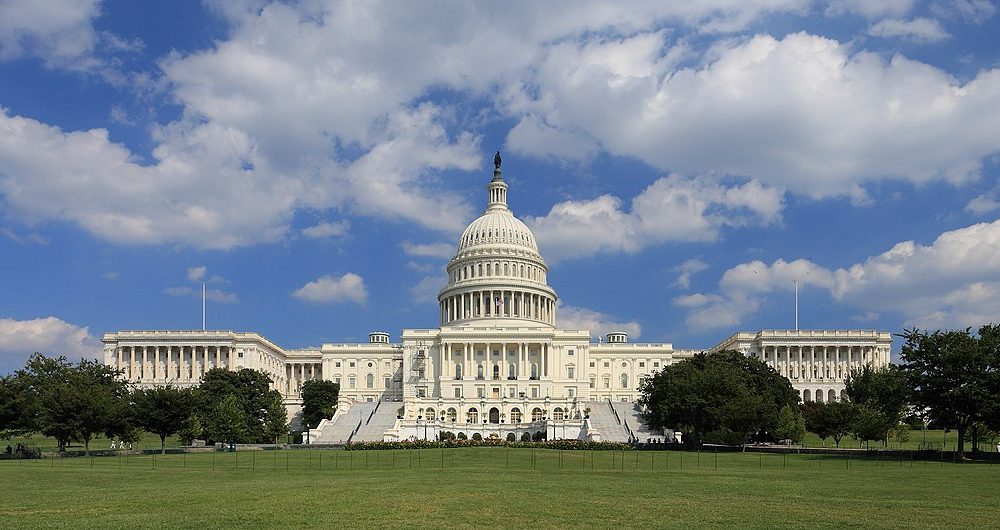
US Capitol - by Martin Falbisoner via Wikimedia Commons
On May 24, a bill was introduced in the U.S. Senate to prohibit political campaigns from using tactics that unwittingly enter donors into recurring contributions. The legislation, Senate Bill 1786, was created in response to a unanimous Federal Election Commission […]
On May 24, a bill was introduced in the U.S. Senate to prohibit political campaigns from using tactics that unwittingly enter donors into recurring contributions. The legislation, Senate Bill 1786, was created in response to a unanimous Federal Election Commission (FEC) legislative recommendation sent to Congress earlier this month.
Titled the “Rescuing Every Contributor from Unwanted Recurrences” (RECUR) Act, the bill amends the Federal Election Campaign Act of 1971 to ban political campaigns from using pre-checked recurring donation boxes, to create a new opt-in requirement for contributors to affirmatively consent to recurring charges, and to require political committees or campaigns to inform contributors about how to cancel recurring contributions and to cancel recurring contributions immediately upon request.
March 22, 2021 •
SB1, For the People Act, Introduced in Senate while HR1, Passed in House, also in Senate

US Capitol - by Martin Falbisoner via Wikimedia Commons
On March 17, a comprehensive bill aimed at reforming U.S. campaign finance, lobbying, and ethics laws, and improving voter rights and election integrity, was introduced in the U.S. Senate. The sweeping bill, Senate Bill 1, For the People Act of […]
On March 17, a comprehensive bill aimed at reforming U.S. campaign finance, lobbying, and ethics laws, and improving voter rights and election integrity, was introduced in the U.S. Senate. The sweeping bill, Senate Bill 1, For the People Act of 2021, is companion legislation to House Bill 1, which passed the House on March 3. That bill, also called the For the People Act of 2021, was received in the Senate on March 11.
The bill would require the registration as a federal lobbyist for those counseling in support of lobbying contacts; require super PACs, 501(c)4 groups and other organizations spending money in elections and on judicial nominations to disclose donors who contribute more than $10,000; and, under the definitions of the Federal Election Campaign Act, add “paid internet or paid digital communication” to the definition of public communication and add “qualified internet or digital communication” to the definition of electioneering communication.
The bill creates a reporting requirement under campaign finance laws for disclosing certain foreign contacts and creates an obligation for political committees to notify the Federal Bureau of Investigation and the Federal Election Commission of those contacts. It also prohibits foreign nationals from participating in decision-making about contributions or expenditures by corporations and other entities; prohibits the establishment of a corporation to conceal election contributions and donations by foreign nationals; and requires foreign agents to disclose transactions involving things of financial value conferred on officeholders.
The bill defines the prohibited coordination between campaigns and super PACs, includes creating a “coordinated spender” category in the law to ensure single-candidate super PACs do not operate as arms of candidates, and defines the prohibited coordination between campaigns and super PACs. The bill would repeal existing prohibitions on the Securities and Exchange Commission from finalizing rules to afford shareholders the opportunity to know about the political spending of publicly traded companies and would require shareholder authorization before a public company may make certain political expenditures. It would also repeal existing prohibitions on the executive branch from promulgating rules to require government contractors to disclose all of their political spending.
The bill requires presidential inauguration committees to disclose their expenditures, limits aggregate contributions, and restricts funds being used for purposes unrelated to an inauguration. Additional measures in the bill include a publicly financed 6-1 matching system on small-dollar donations for Senate and presidential candidates, more ethics changes to the executive branch, and substantial changes to federal election law and voter rights.
February 4, 2021 •
Spotlight Act: US Senate Bill to Enhance Disclosure of Financial Political Activity Reintroduced

US Capitol - by Martin Falbisoner via Wikimedia Commons
On February 3, U.S. Senators Jon Tester and Ron Wyden reintroduced a bill to reverse a U.S. Treasury Department’s decision limiting IRS disclosure requirement of certain tax-exempt organizations engaging in political activities. Senate Bill 215, the Spotlight Act, requires non-profit […]
On February 3, U.S. Senators Jon Tester and Ron Wyden reintroduced a bill to reverse a U.S. Treasury Department’s decision limiting IRS disclosure requirement of certain tax-exempt organizations engaging in political activities.
Senate Bill 215, the Spotlight Act, requires non-profit organizations engaging in political activity, such as donating to candidates and purchasing political ads, provide the IRS with the names and basic information of donors who contribute more than $5,000.
The bill repeals an IRS revenue procedure exempting certain tax-exempt organizations that are not 501(c)(3) organizations from the requirement to report the names and addresses of substantial contributors (persons who contribute more than $5,000 per year) on information returns that are filed with the IRS. The proposed legislation requires tax-exempt organizations falling under sections 501(c)(4), 501(c)(5), and 501(c)(6) of the Internal Revenue Code (e.g., social welfare organizations, labor organizations, business leagues) to disclose the names and addresses of all substantial contributors on their returns. The bill also eliminates the authority of the IRS to provide exceptions to the disclosure requirements for tax-exempt organizations.
A version of the Spotlight Act was first introduced by the Senators in 2018
December 9, 2020 •
US Senate Confirms Three New Commissioners to the FEC
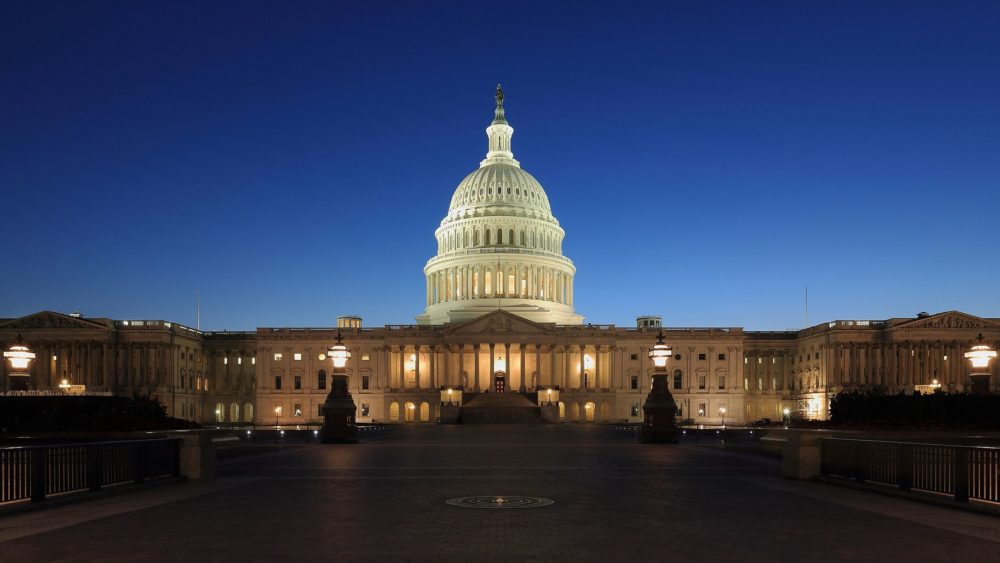
U.S. Capitol - by Martin Falbisoner
On December 9, the U.S. Senate restored a full complement of commissioners to the Federal Election Commission (FEC). By confirming three new commissioners, the FEC, where only three of the agency’s six seats were filled since July 4, will now […]
On December 9, the U.S. Senate restored a full complement of commissioners to the Federal Election Commission (FEC).
By confirming three new commissioners, the FEC, where only three of the agency’s six seats were filled since July 4, will now be able to conduct official business. The FEC requires at least four commissioners to agree on any official action.
The Senate confirmed one Democrat, Shana Broussard, and two Republicans, Sean Cooksey and Allen Dickerson. No more than three members of the FEC may be registered with the same political party.
The remaining FEC commissioners are Chair James E. “Trey” Trainor III, a Republican, Ellen L. Weintraub, a Democrat, and Steven T. Walther, an Independent.
November 11, 2020 •
Two Georgia Runoffs to Determine Control of U.S. Senate
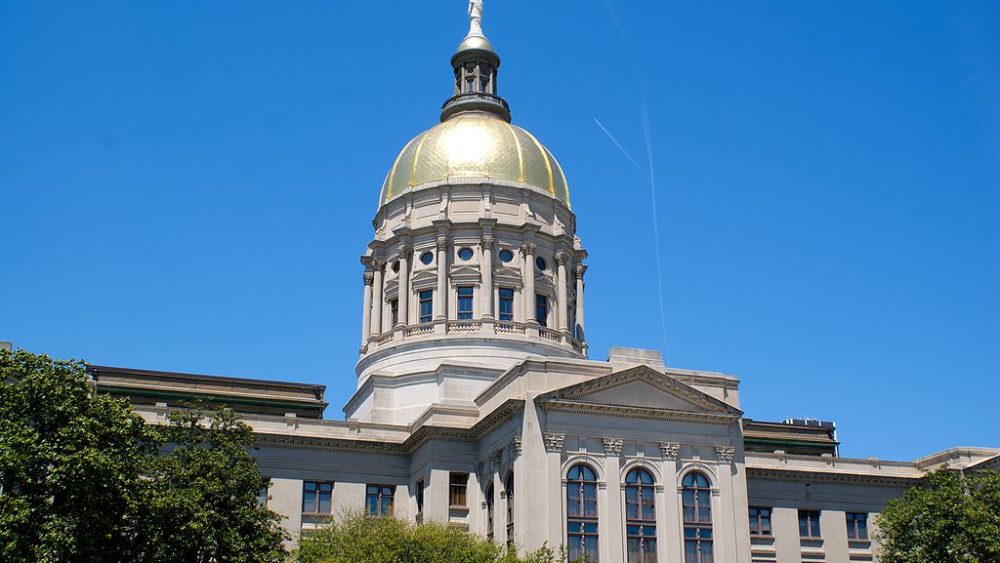
Georgia State Capitol Building
Republican incumbent Sen. David Perdue failed to secure a majority in his reelection bid, which means now both of Georgia’s U.S. Senate races will be decided by runoff elections on January 5, 2021. Perdue will face Democratic challenger Jon Ossof […]
Republican incumbent Sen. David Perdue failed to secure a majority in his reelection bid, which means now both of Georgia’s U.S. Senate races will be decided by runoff elections on January 5, 2021.
Perdue will face Democratic challenger Jon Ossof and Democrat Raphael Warnock will face Republican Kelly Loefflerin.
The runoffs will determine control of the U.S. Senate.
November 4, 2020 •
U.S. Senate Race Heads for January Runoff

Georgia State Capitol Building
With no candidate securing a majority, one of Georgia’s U.S. Senate races is heading for a runoff election. Democrat Raphael Warnock and Republican Kelly Loeffler will face each other in the runoff election scheduled for January 5, 2021.
With no candidate securing a majority, one of Georgia’s U.S. Senate races is heading for a runoff election.
Democrat Raphael Warnock and Republican Kelly Loeffler will face each other in the runoff election scheduled for January 5, 2021.
November 4, 2020 •
Strauss Reelected as D.C.’s Shadow Senator

U.S. Capitol - by Martin Falbisoner
Paul Eric Strauss was re-elected as the senior U.S. shadow Senator for the District of Columbia. The junior U.S. shadow Senator for the District is Mike Brown. While not officially sworn in or seated with the U.S. Senate, the main […]
Paul Eric Strauss was re-elected as the senior U.S. shadow Senator for the District of Columbia.
The junior U.S. shadow Senator for the District is Mike Brown.
While not officially sworn in or seated with the U.S. Senate, the main goal is to seek voting representation in the U.S. Congress for the District.
Neither Strauss nor Brown receive pay or have offices in the US Capitol.
March 6, 2020 •
Nomination for Fourth FEC Commissioner to be Considered
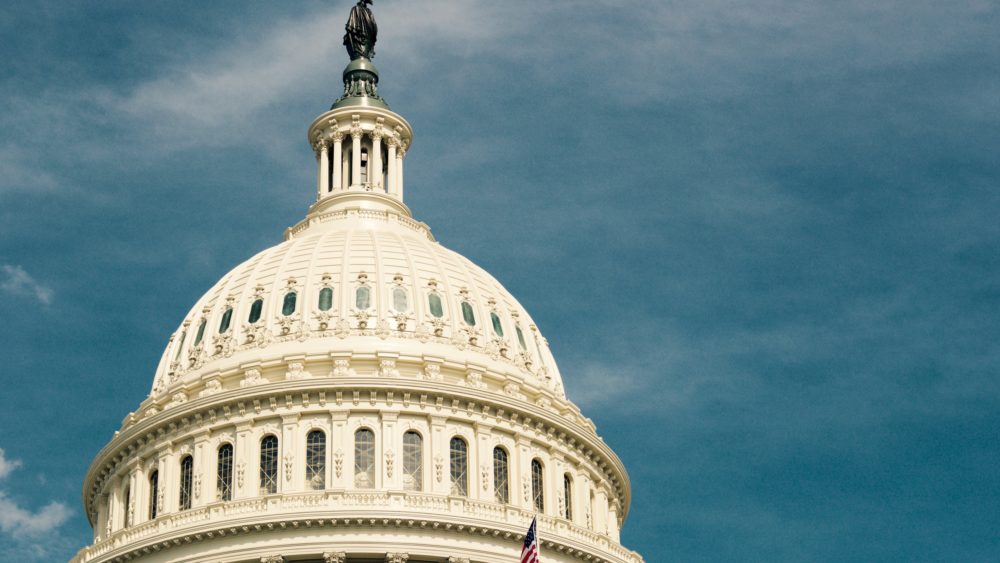
On March 10, the U.S. Senate Rules and Administration Committee will hold a nomination hearing. This will comprise of the full committee to consider James “Trey” Trainor as a commissioner on the Federal Election Commission (FEC). Trainor is a […]
On March 10, the U.S. Senate Rules and Administration Committee will hold a nomination hearing.
This will comprise of the full committee to consider James “Trey” Trainor as a commissioner on the Federal Election Commission (FEC).
Trainor is a lawyer licensed in Texas who specializes in election law, campaign finance, and ethics.
Trainor previously served in the president’s administration as a Special Assistant to the Secretary of Defense, James Mattis, in the Department of Defense, Office of General Counsel.
President Donald J. Trump had originally nominated Trainor to serve as a commissioner in 2017, but a hearing was never held.
Currently the FEC, which has three of its six commissioner positions vacant, does not have a quorum to take most formal measures.
The FEC requires at least four commissioners to agree on any official action.
To become a commissioner, Trainor must be confirmed by the full U.S. Senate.
March 16, 2018 •
Mississippi U.S. Senator to Retire
U.S. Sen. Thad Cochran is retiring because of ill health on April 1. Gov. Phil Bryant has 10 days after receiving an official notice of the vacancy to temporarily appoint a replacement until a successor is elected. Bryant has yet […]
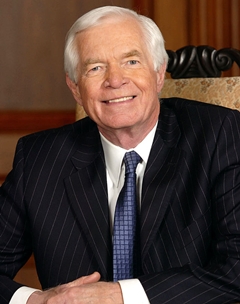 U.S. Sen. Thad Cochran is retiring because of ill health on April 1.
U.S. Sen. Thad Cochran is retiring because of ill health on April 1.
Gov. Phil Bryant has 10 days after receiving an official notice of the vacancy to temporarily appoint a replacement until a successor is elected.
Bryant has yet to choose a replacement for the vacant seat. The special election will be held on November 6.
May 30, 2017 •
“Close the Revolving Door Act of 2017” Would Enact Lifetime Lobbyist Ban on Members of Congress
Members of Congress could be banned from being lobbyists for life if legislation introduced this month becomes law. Senate Bill 1189, Close the Revolving Door Act of 2017, places a lifetime ban on current members of Congress from becoming lobbyists. […]
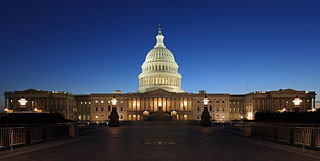 Members of Congress could be banned from being lobbyists for life if legislation introduced this month becomes law.
Members of Congress could be banned from being lobbyists for life if legislation introduced this month becomes law.
Senate Bill 1189, Close the Revolving Door Act of 2017, places a lifetime ban on current members of Congress from becoming lobbyists. Senators Michael Bennet, Cory Gardner, and Al Franken introduced the legislation, which also increases the statutory staff restrictions on lobbying from one year to six years.
Additionally, the bill bans lobbyists from joining Congressional staffs or committee staffs they lobbied for six years and increases the maximum penalty for violating the Lobbying Disclosure Act.
“Our legislation would put in place much-needed reforms-by not only banning members of Congress from becoming lobbyists, but also by making the industry become more accountable and transparent,” Franken said in a press release.
July 2, 2014 •
Arkansas Adjourns Special Session
Lawmakers ended a special session shortly after midnight on Wednesday, July 2, 2014. The House and Senate gave approval to a package of bills regarding teacher health insurance premiums, prison overcrowding, and limits on lottery monitor games. Photo of Arkansas […]
 Lawmakers ended a special session shortly after midnight on Wednesday, July 2, 2014. The House and Senate gave approval to a package of bills regarding teacher health insurance premiums, prison overcrowding, and limits on lottery monitor games.
Lawmakers ended a special session shortly after midnight on Wednesday, July 2, 2014. The House and Senate gave approval to a package of bills regarding teacher health insurance premiums, prison overcrowding, and limits on lottery monitor games.
Photo of Arkansas State Capitol Building by Stuart Seeger on Wikimedia Commons.
State and Federal Communications, Inc. provides research and consulting services for government relations professionals on lobbying laws, procurement lobbying laws, political contribution laws in the United States and Canada. Learn more by visiting stateandfed.com.

